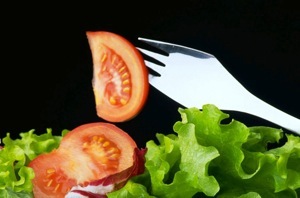-
Lifestyle Issues



Eat Well & Get Regular Exercise
Here you are at college. Maybe this is the first time you have lived on your own. Are you wondering what to eat? Worried about gaining weight? Concerned about looking good and staying fit? The food and exercise choices you make will play a major role in helping you not only stay healthy, but also increase your ability to do well in classes.
A Few Words About the Basics
Much like a car, your body runs best when supplied with the most efficient source of fuel, in this case – carbohydrates. Carbohydrates are classified as either simple or complex. Simple carbohydrates, often called sugars, occur naturally in some foods, especially fruits. Complex carbohydrates, commonly known as starches, are found in grains (rice, bread, pasta), beans, and vegetables, particularly starchy vegetables, such as potatoes and corn.
Frequently accused as fattening, carbohydrates are actually very filling and help you maintain a healthy weight. Carbohydrates contain four calories per gram; fats have 9. It would take a man who needs 3,000 calories 30 potatoes to maintain his body weight if no other foods were eaten!
Carbohydrates are not as easily turned into body fat as are dietary fats because they “burn” more efficiently. Of course, any time you consistently eat more calories (regardless of the source) than you burn, your body will store the excess energy as fat. The guideline is to eat about 55 to 60% of your calories from carbohydrates, primarily complex ones. A good way to visualize this is to have carbohydrate foods occupy two-thirds of the food on your plate.
Fats add flavor to foods and also help you feel full from a meal. Although fat is one of the most criticized nutrients, some fat in the diet is necessary because it supplies essential fatty acids. The guideline is to eat 30% or less of your calories from fats. This is about 60 to 65 grams of fat per day for the average person.
How about protein? Protein is found in both animal and plant sources and is an essential nutrient for it is the main structural component of all tissues in the body. The guideline is to eat 10 to 15% of your calories from protein. This amount is easily supplied from foods you eat. Excessive intake of protein (whether from foods or supplements) may actually create health problems and does not lead to greater muscle mass!

Weight Worries
Has the fear of “The Freshman Fifteen” set in yet? Weight gain is not an inevitable part of college life. Sometimes, weight gain is even acceptable. Cafeteria meals, fast food, and regular restaurants all offer a variety of healthy food choices. Strive for a balance. If you choose a higher calorie food, such as french fries with a meal, balance it with lower calorie items – vegetables, salad with low-fat dressing, and fresh fruit.
Want to know more about balancing your diet and weight? Check out the information available through the Web sites listed on page 86. Or, browse in your bookstore for The American Dietetic Association’s Complete Food and Nutrition Guide by Roberta Duyff or Dieting for Dummies by Jane Kirby.
Don’t forget the other side of the equation which is exercise. Eating right and exercising regularly will keep you in top form. Do exercises that you enjoy. Exercise at least 3 times a week. Choose some form of aerobic exercise, such as walking, swimming, Tai (Tae) Bo, etc. Do stretching and strengthening exercises, too. For more information on exercise, access the Web site: www.fitness.gov.
Breakfast for Better Grades
Starting the day with breakfast is the key to learning. People who eat breakfast perform better on cognitive tests, have better verbal fluency, and increased memory. This may not translate into passing college chemistry, but it does give you a fighting chance.
Eating breakfast also helps you maintain weight. People who eat breakfast generally burn 4 to 6% more calories than people who do not eat breakfast.
Many students skip breakfast. It is best if you don’t. For breakfast, have whole grain cereal and milk; a breakfast sandwich on whole grain bread; yogurt with granola; cottage cheese with fresh fruit; leftover pizza, or a muffin or bagel with milk and an apple. Take a bagel or pop tart and a juice box to class with you, if you don’t set aside time to eat breakfast.
Going Vegetarian?
If you are thinking about trying a vegetarian eating style, you may not know where to begin. Vegetarianism means eating mostly plant foods. If you include dairy and egg products in your eating plan, it is easier to meet your nutrient needs. If you’re a vegan – which means you only eat plant foods – you may need to supplement your diet with calcium, iron, zinc, and vitamins B12 and D.
Start slowly. Begin by changing some of your favorite recipes – decrease meat and add more pasta, beans, rice, or vegetables. Look for vegetarian meat alternatives, like soy or veggie burgers. Experiment with different types of beans, pasta, and rice. Try red, black, navy, or pinto beans, or split peas and lentils. Look for different types of rice – from plain white to mixed brown and long grain. Top salads with chickpeas or red beans instead of cheese. You will also need to increase fluids, such as water or juices, to help with the increased fiber.
If you are looking for more information on being a vegetarian, try www.vrg.org (The Vegetarian Resource Group).
Snacks and Your Backpack
Snacking is a big part of hectic college life. When you are out shopping for snacks, stock up on pretzels, fruit, graham crackers, mini-size cereal boxes, popcorn, meal replacement bars, etc.
If snacking and studying go together, try setting a schedule. Study for one hour and then grab a snack. This helps keep calories in control. Measure out a portion size of the snack rather than eating out of a large box or bag.
When it comes to eating on the run, have a 6 inch submarine sandwich on a whole grain roll or a vegetarian pita. Don’t go long periods of time without eating. This leaves you famished and fatigued.
Stress and Emotional Eating
College life may leave you feeling stressed. Do you need extra vitamins and nutrients? Though a busy schedule may sometimes cause people to neglect eating well, we do not use any more (or fewer) nutrients while under mental stress. When you are feeling stressed and strung-out, try these tips:
-
•Take time to take care of yourself. This includes taking time to eat well. Don’t just snack all day. Sit down and enjoy your meal.
-
•Try quick foods, such as fresh, canned, or frozen veggies added to canned soups or pastas. Order in if you like, but try not to skip meals.
-
•Start your day with breakfast! It will help you get going for the rest of the day.
Food cravings may be a sign of hunger created from skipping meals, from a lack of nutrients in your diet, or an attempt to satisfy emotional needs. Food won’t solve your emotional dilemmas. The next time you find yourself heading for the fridge for a quick emotional fix, use the following tips:
-
•You are studying for that big exam and find yourself nervous and anxious. Instead of splurging on ice cream, seek out different relaxation techniques. Sit quietly with your eyes closed and breathe deeply for a few minutes. Or, go for a quick walk. Get enough sleep. Sleep deprivation makes most people anxious and irritable.
-
•You’ve had a big fight with your roommate and are furious. Anger can cause overeating quicker than most other emotions. Instead of eating as a response to this, try, instead, to confront the target of your anger. Have that difficult conversation after you have had a chance to calm down or write out your feelings in a letter.
-
•You find yourself with nothing to do, but sit around and eat. Many people eat out of boredom. Solution? Diversion! Find something else to capture your attention. Find which diversions work best for you and use them.
-
•Most importantly, don’t spend time feeling guilty when you eat to get an emotional fix. Doing this occasionally is not a problem.

Copyright © 2007, American Institute for Preventive Medicine. All rights reserved.



For more information, contact:
MyPyramid.gov Web site | www.mypyramid.gov
Go Ask Alice Web site | www.goaskalice.columbia.edu

